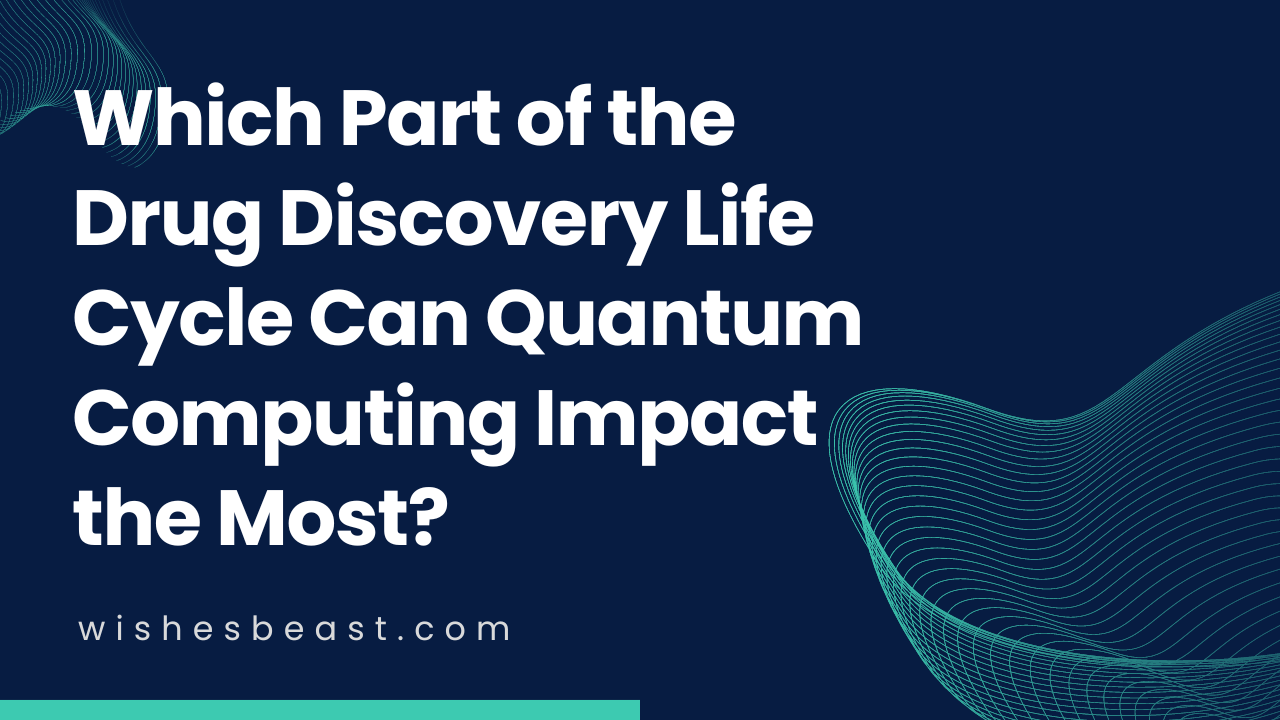The world of pharmaceuticals is on the brink of a quantum leap. Imagine slashing the time and cost of drug discovery, ensuring a brighter, healthier future for all. It’s not a dream—it’s the potential reality unlocked by quantum computing. This powerful technology promises to redefine the drug discovery life cycle. But where does it fit in best and which part of the drug discovery life cycle can quantum computing impact the most?
Quantum Chemistry Simulations: The New Frontier
At the core of drug discovery is the understanding of molecular interactions. Quantum chemistry simulations offer a more accurate representation of these interactions than ever before. By simulating the behavior of molecules at the quantum level, scientists gain unparalleled insights into their properties, setting the stage for breakthroughs in drug design.
Applications of Quantum Chemistry Simulations in Drug Development
Quantum simulations allow for intricate predictions of how molecules will behave. With this, researchers can pinpoint how a new drug candidate might interact with our body, predicting side effects and efficiencies long before a physical prototype is developed. Such foresight could save invaluable time and resources.
Quantum Algorithms & Molecular Modeling: A Perfect Match
Quantum algorithms can significantly improve molecular modeling for drug design. The superposition and entanglement properties of quantum computing enable simultaneous calculations, making the exploration of vast molecular landscapes more feasible.
Enhancing Ligand-Protein Interaction Predictions
One of the trickiest parts of drug design is predicting how a potential drug (ligand) will interact with its target protein. Quantum computing provides a more detailed look at these ligand-protein interactions, ensuring that drugs are both effective and safe.
The Role of Quantum Computing in High-throughput Screening
In the early phases of drug discovery, millions of compounds are screened for potential efficacy. Quantum-enhanced simulations can expedite this high-throughput screening, identifying potential drug candidates faster than conventional methods.
Computational Chemistry & Quantum’s Power Duo
Computational chemistry, combined with quantum algorithms, holds promise to resolve longstanding challenges in drug design. Quantum-powered molecular simulations provide more accurate data, facilitating the creation of more effective drugs.
Benefits of Quantum Algorithms in Structure-based Drug Design
Structure-based drug design relies heavily on the precise knowledge of molecular structures. Quantum-enhanced simulations can analyze these structures with greater accuracy, refining the drug design process.
Virtual Screening & Quantum Computing: The Future
Virtual screening, the computerized prediction of potential drugs, stands to benefit immensely from quantum computing. Quantum-inspired algorithms can sift through vast molecular databases with enhanced accuracy, shortening the path to drug discovery.
Challenges and Opportunities: Quantum’s Role in Drug Discovery
While quantum computing offers immense promise, it’s essential to recognize challenges. Quantum hardware is still maturing, and integrating it with current pharmaceutical research methods will require time. However, the opportunities far outweigh these challenges. Quantum-enhanced methods, when compared to traditional approaches in drug discovery, showcase increased speed and accuracy, promising a brighter future for pharmaceutical research.
Quantum-Powered Molecular Simulations: The Deep Dive
A deeper understanding of molecular behavior is crucial for drug discovery. With traditional computing, simulations at an atomic or molecular level require vast computational resources, often with simplified models. However, quantum-powered molecular simulations go several steps further. Quantum mechanics naturally governs the behavior of molecules, so using quantum computers to simulate them is inherently more accurate. The ability of quantum systems to compute multiple states simultaneously (superposition) gives an exponential speed-up in many cases, enabling simulations of larger and more complex molecules and their interactions.
Quantum Machine Learning in Pharmaceutical Research
Machine learning has already changed the landscape of many industries, including pharmaceuticals. But when combined with quantum computing, the possibilities are truly groundbreaking. Quantum machine learning can process vast datasets more efficiently than classical algorithms, drawing correlations and patterns that might be missed otherwise. For drug discovery, this means that the screening of compounds, understanding disease patterns, and predicting drug outcomes can be drastically improved.
Quantum Annealing in the Drug Discovery Process
Quantum annealing, a specific type of quantum computing, focuses on problem optimization. For drug discovery, this is like finding a needle in a haystack when identifying a perfect molecule for a specific biological target. Quantum annealing can traverse this vast molecular landscape, identifying optimal solutions far more rapidly than classical methods.
Binding Affinity Prediction with Quantum Computing
One of the most critical aspects of drug discovery is predicting how strongly a drug candidate will bind to its target, known as binding affinity. Accurate predictions can mean the difference between a drug that’s potent and one that’s ineffective. Quantum-based methods offer a more detailed and nuanced prediction, taking into account intricate quantum interactions that classical computers struggle with. This could dramatically reduce the trial-and-error approach currently predominant in drug development.
Biomolecular Systems: Quantum Computing’s Ideal Playground
Biomolecular systems are inherently quantum in nature. From electron transfers in biochemical reactions to protein folding dynamics, quantum mechanics plays a fundamental role. Quantum computers, therefore, offer a natural and intuitive platform to understand and simulate these processes. Insights gained from such simulations can inform everything from drug mechanisms to potential side-effects long before a drug enters clinical trials.
The Limitations and Future Prospects of Quantum Computing in Pharmaceuticals
No technology is without its challenges, and quantum computing is no exception. Current quantum computers, termed Noisy Intermediate-Scale Quantum (NISQ) devices, are prone to errors and require very specific conditions to operate. Integrating quantum solutions into the current drug discovery pipeline also presents a steep learning curve.
However, with rapid advancements in quantum error correction, hardware, and algorithms, the prospects are promising. As quantum technology matures, its integration into pharmaceuticals will become more seamless, leading to a paradigm shift in how we discover and develop drugs.
Comparing Quantum-Based Methods to Traditional Approaches
When comparing quantum-based methods to traditional drug discovery techniques, the former provides a higher resolution view of molecular interactions. While classical methods have given us many of the drugs we use today, they often require longer development times and more resources. Quantum methods promise a faster, more efficient route, providing deeper insights and potentially reducing the time from concept to marketable drug.
FAQs
How can quantum computing improve drug discovery?
By offering accurate molecular simulations, enhancing ligand-protein interaction predictions, and expediting high-throughput screening.
What are the applications of quantum machine learning in pharmaceuticals?
Quantum machine learning can analyze vast datasets faster and more accurately, predicting drug behaviors and optimizing drug design.
How do quantum annealing and drug discovery connect?
Quantum annealing can optimize complex problems, such as predicting how molecules will interact, enhancing the drug discovery process.
Are there real-world examples of quantum’s impact on drug development?
Companies like IBM and Google are already collaborating with pharmaceutical giants to explore the applications of quantum computing in drug discovery.
Also Read: Which Situation is a Current Example of a Use Case in Quantum Computing?
Conclusion
Quantum computing, with its unmatched computational prowess, is set to revolutionize the drug discovery life cycle. From quantum chemistry simulations to high-throughput screening, every step of the process stands to benefit. As this quantum era dawns, we can look forward to quicker, more efficient, and more effective drug discovery processes.
To sum it up, the insights shared in this article about “Which Part of the Drug Discovery Life Cycle Can Quantum Computing Impact the Most?” have sought to demystify the subject matter and provide you with a solid foundation for further exploration.

